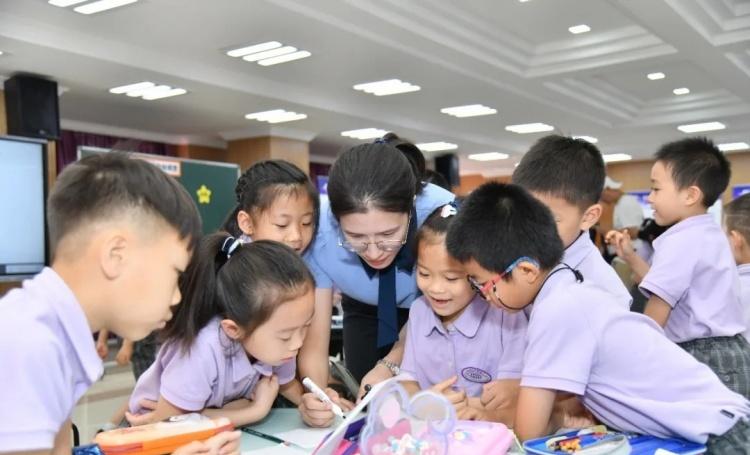If you go to Disneyland in the autumn, the play time is 4 hours, how to do the strategy to let the whole class play as much as possible to the projects they want to play? In the face of such a "problem", the students of the second and third grades of FushanWai Chinese Primary School in Pudong New Area were very calm. Because they have explored the mystery of "data" in math class, through project-based learning, starting from real life situations, and thus found their own answers.
On September 27th, the first activity of the third round of the Shanghai Compulsory Education Project-based Learning Three-Year Action Plan Special Workshop was held in Fuwai. In the face of experts from the Institute of General Education of the Shanghai Municipal Academy of Education, the Pudong New Area Education Development Research Institute, the Shanghai Academy of Educational Evaluation and PISA Research Center, and the mathematics teachers of more than 30 primary schools in the city, the Fuwai mathematics teacher team presented the exploration results of "the design and implementation of mathematics projects that point to the learning of big concepts", which was highly affirmed.

Buzz Lightyear, Peter Pan, The Seven Dwarfs... Each of the ten projects has students who want to play, how to choose? In the background music of the cartoon, Ms. Wang Jieyu brought the math class "Disney Autumn Raiders - Investigation of Favorite Projects" to the second-grade students. She introduces problem-driven into the curriculum, allowing students to generate a sense of substitution from the context, which in turn generates statistical needs. From the heated discussion of "which projects I want to play" to the statistics of "which projects can the class play together", students exercise their ability to listen and cooperate in group discussions, try the two different data collection processes of class voting and group voting, think about the meaning of tables and data, and then read the information contained in the table data, and then make reasonable speculations. When the one-hour course was nearing the end, the projects that 5 classes wanted to play had been selected, and some students reminded Wang Jieyu: "Many people like to play projects, and the queue may be longer!" "Staggering the two classes by arranging in advance will reduce queuing time."
"Students generate problems independently, think and explore independently, have higher enthusiasm for learning, and have better learning results, which is the change that project-based learning brings to the classroom." Wang Jieyu said that in the past year, the Fuwai Mathematics Group has continuously discussed and promoted project-based learning, and designed two project-based learning units of data statistics and weight units, which not only broke the restrictions of grade and class hours, but also subverted the traditional classroom teaching method based on imparting knowledge, all of which made the young teacher who has been in the industry for 6 years sigh: "The original class can still be like this, and the students' harvest will be so much." ”
"The original intention of carrying out project-based learning is to hope that the teaching of teachers will change and make the main classroom of the school more efficient; it is also hoped that students' learning will be more in-depth and point to the formation of students' core literacy." Principal Qian Fang introduced that Pudong New Area is the first round of compulsory education project-based learning three-year action plan to create a district. Fuwai is the only Shanghai Three-Year Action Plan Seed Experimental School in Pudong. Since September last year, adhering to the principle of "learning by doing", from easy to difficult, from shallow to deep, we have carried out project-based learning design and practice in terms of activity projects, discipline projects and interdisciplinary projects. The activity project section implants project-based learning elements in the school's traditional projects such as the inquiry section in foreign language festival activities, the fifth grade vocational experience, the language traditional culture inquiry project, and the English independent theme inquiry learning project. In the subject project section, try to experiment with mathematics, music and other disciplines from the perspective of "big concept", integrate project-based learning, unify the learning content of the unit, carry out structured learning design, and guide students to develop high-level thinking activities. The interdisciplinary project section trains students to solve problems creatively in the learning process through STEM and the theme study course of international understanding education.
"This kind of exploration is very challenging and forward-looking." Xia Xuemei, deputy director of the Institute of General Education of the Shanghai Municipal Academy of Educational Sciences and director of the Shanghai Learning Literacy Curriculum Research Institute, said in her comments that the workshop was the first time that the core mathematical concepts were discussed in the form of discipline projects in the municipal seed school workshop, and the teachers in Fuwai showed great courage. Liu Wenjie, vice president of Pudong Education Development Research Institute, expects that in the future exploration, Fuwai energy will continue to play the leading role of the radiation of the Municipal Seed Experimental School, provide more and more generalizable experience, and drive the practical innovation of project-based learning in Pudong New Area and Shanghai.
Column Editor-in-Chief Zhang Qi
Responsible Editor Liqi Ni
Image source Courtesy of the interviewee